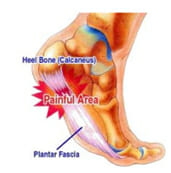Recently Absolute PhysioCare & Sports Rehab in Burnaby has had many clients requiring plantar fasciitis treatment which inspired me to write this blog.
As people are preparing for the most popular Vancouver Sun Run and individuals are conscious about their health and wellbeing, more and more people are starting to run again.
 Common running errors such as: improper footwear, over-pronation (flat footed), obesity, inadequate amount of stretching/warm-up, can all lead up to an inflamed fascia causing sharp, stabbing pain at the heal and arch of the foot which can be debilitating and prevent you from your activities.
Common running errors such as: improper footwear, over-pronation (flat footed), obesity, inadequate amount of stretching/warm-up, can all lead up to an inflamed fascia causing sharp, stabbing pain at the heal and arch of the foot which can be debilitating and prevent you from your activities.
Plantar fasciitis is a thick band of tissue that runs across the bottom of your foot connecting the heel bone to your toes. When this band of tissue is over stretched/strained it can develop micro-tears that cause inflammation.
The most common symptoms of plantar fasciitis:
- Pain at the heel and arch of the foot
- Worst when taking the first few steps after awakening or can be triggered with long periods of standing or getting up after prolonged sitting
- Quite tender to the touch
So how can we treat this stubborn pain that won’t go away! There are many things you can do to treat plantar fasciitis and it needs to be done regularly or else it will keep coming back.
Plantar fasciitis treatment includes:
- Localized deep tissue massage to the inflamed area
- Modalities such as: ultrasound, laser, interferential current
- Ice massage
- Acupuncture
- Athletic Taping
- Stretching the hamstrings and calves
- Foot and ankle joint mobilization
- Strengthening the foot musculatur
- Night splints
- Custom foot orthotics
- Assessment of the biomechanics of your feet using a gait scan analysis
Preventative care is extremely important; therefore make sure to wear supportive footwear with good arch support and heel cushioning. If you stand at work for prolonged periods of time invest in a cushioned mat to stand on to reduce the stress off of your feet. Also, make sure to have a stretching routine especially for the calves and hamstrings. Furthermore, maintain a healthy weight for your height. Lastly, if you haven’t exercised in a long time or haven’t exercised before make sure to gradually increase your exercise level.
If you are suffering from plantar fasciitis and have further questions feel free to contact our office and book an appointment to see one of our physiotherapists who will be able to assess your injury and provide treatment options that would be best suitable for you.
If you are interested in the gait scan analysis and want to learn more please click here.
This blog was created by Shaila Jiwa, Physiotherapist at Absolute PhysioCare & Sports Rehab in Burnaby.
To learn more about Absolute PhysioCare‘s sports rehabilitation and sports physiotherapy programs, contact us at 604-558-2273.
